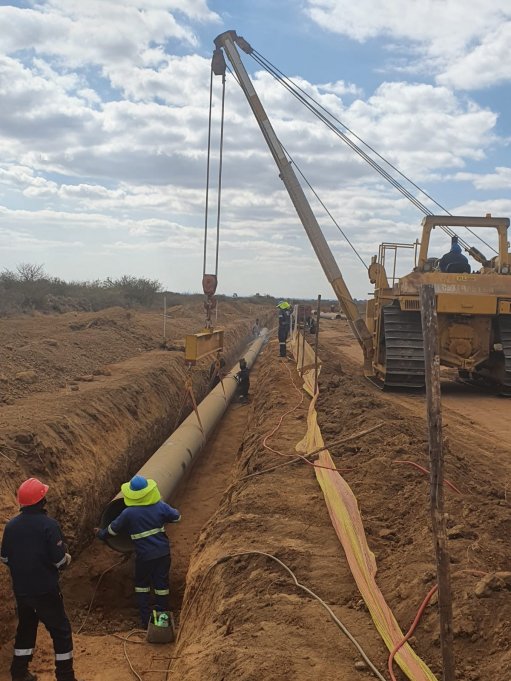
PIPE DREAM The added health and safety standards required on the project owing to Covid-19 have made for challenging times on the project
Multidisciplinary engineering, procurement and construction management house COENG is offering its occupational health and safety, as well as environmental management, expertise to the second phase of the Klipdrift Water Treatment Works project in the Hammanskraal area, in northern Gauteng and North West provinces.
The project owner is Magalies Water, a water board based in the North West. The construction entails a 30 km bulk supply pipeline to local municipalities and a command reservoir. The municipalities mainly include Moretele South as well as supply to the Babelegi reservoir in the City of Tshwane Metropolitan.
This project is referred to as the Moretele South bulk water supply system and currently the construction of the bulk pipeline is in progress, which is on track for completion in April 2021. A 25-million-litre command reservoir will be constructed in a future phase.
COENG health and safety manager Charity Tagwireyi says the additional supply will predominantly be dedicated to the Moretele South local municipality.
The project entails facilitating the correct construction work permits from the Department of Employment and Labour, enforcing occupational health and safety specifications, as well as project-specific and comprehensive baseline risk assessments, explains Tagwireyi.
“Further services include monthly occupational health and safety compliance audits as well as continuously monitoring compliance throughout the project duration,” she adds.
The work being conducted includes excavation work; laying of pipes from 500 mm to 750 mm nominal diameter planned during Phase 2; pipe jacking across the N1 freeway, the R101 road, a railway line and the Apies river; as well as constructing the inlet and outlet chambers and appurtenant infrastructure along the pipeline route.
Tagwireyi explains that, while progress is being made, the company is dealing with many challenges, particularly in terms of having to implement strict Covid-19 health and safety procedures in addition to those already in place.
“These include preshift safety talks and inductions, which are challenging because ensuring that employees practice physical distancing makes it difficult to train all employees at once.”
She adds that tools handling is also addressed through ensuring that employees sanitise hand-held tools before using them, which can be time consuming and, therefore affect productivity.
The company has also had to implement stricter pre-employment medicals, as Covid-19 testing has been added to the procedure, making the whole process more expensive and time consuming, Tagwireyi concludes.